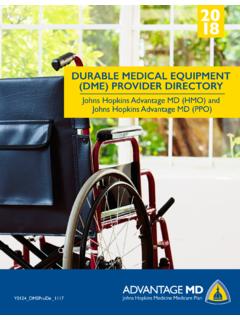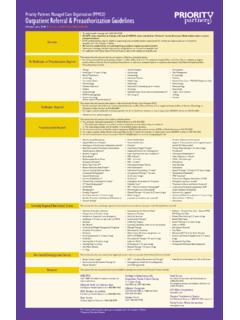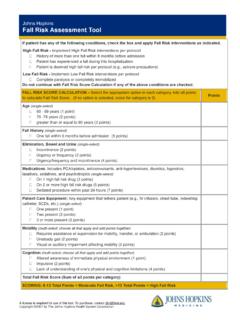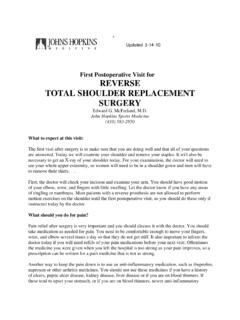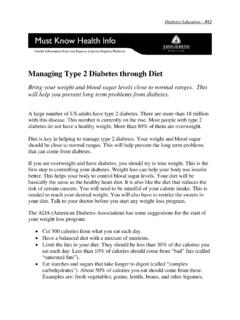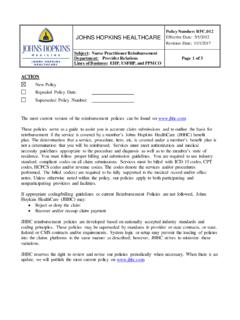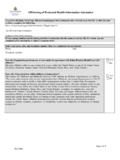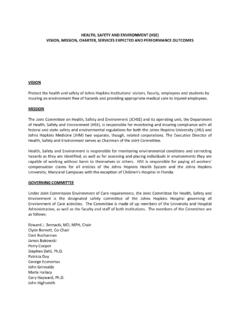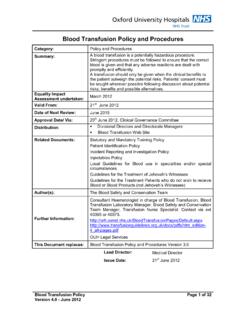Transcription of Essential Standard Operating Procedures Sample Templates
1 Essential Standard Operating Procedures Sample Templates Table of Contents Introduction Study Conduct and Good Clinical Practice 1: JHM Training/Certification Documentation 2: Delegation of Responsibility 3: Process for Obtaining Informed Consent 4: documenting Informed Consent 5: documenting Eligibility Assessment 6: Submitting Changes in Research 7: Protocol Deviation reporting and Documentation 8: reporting Study Non-Compliance 9: reporting Unanticipated Problems/ events 10: reporting the Death of a JHM Research Participant Subject Information/Data 11: Study Subject Data Collection 12: Paper Case Report Form Design and Use 13: Site Generated Electronic Case Report Forms FDA Regulated Studies and Principal Investigator Responsibilities 14: Responsibilities for FDA Regulated Research 15: Required reporting to FDA IND Studies 16: Sponsor-required Written General Monitoring Plan for FDA IND Studies 17: Drug Accountability 18: Required reporting to FDA IDE Studies 19: Sponsor-required Written General Monitoring Plan for FDA IDE Studies 20: IDE Device Accountability - Receipt and Storage 21: IDE Device Accountability - Usage of Device 22: IDE Device Accountability Device Return Regulatory Procedures 23: Regulatory Documentation Organization 24: Retention of Study Records 25: Writing Standard Operating Procedures 26: Note-to-File JHM IRB COMPLIANCE GUIDE FOR DEVELOPING Standard Operating Procedures INTRODUCTION The Compliance Monitoring Team has created Standard Operating Procedure Templates (SOPs) in response to action items discovered in IRB directed audits, FDA audit and site visits, and routine monitoring visits.
2 These Templates were designed in order to assist researchers in establishing their own set of rules, or SOP criteria, and to help study staff operate their respective studies in an organized and consistent manner, that demonstrates adherence to Federal regulations and Institutional guidance. The SOP Templates and the corresponding Case Report Form/checklists cover the basic categories of study Procedures and can be applied across studies. SOP samples are available below. samples of the SOPs listed here include: How to obtain Informed Consent from research subjects documenting the Informed Consent process Maintaining Regulatory Documents Study Record retention Serious adverse Event reporting Safety reporting for routine adverse events and Protocol Deviations The Templates follow a formal format that includes the following structure: I. A header indicating the title, date, author, version number, pages, and approval information (if applicable).
3 II. The body of the document includes the purpose, scope, references (if applicable), and a number of detailed Procedures . When developing your own specific SOPs, you may consider using a less formal structure. If your study requires more specific content, please consider tailoring your individual site and/or protocol Standard Operating Procedures to suit your needs. Other areas to consider when designing your site-specific SOPs: Communication Procedures (IRB, NIH, FDA, Sponsor, other) Protocol Continuing Renewal Protocol Termination IND S afety reports IND Annual reports IND Sponsor-required Written General Monitoring Plan IDE Progress Reports IDE Unanticipated adverse Device Effect reporting IDE Sponsor-required Written General Monitoring Plan Withdrawal of Subjects Oral Consent process Assent and Consent of Minors Change In PI /Inherited studies DSMB reporting requirement Standard Operating Procedures : JHM Training/Certification Documentation The Principal Investigator is responsible for: 1.
4 Completing and passing the following training modules: a. Human Subjects Research Compliance b. Course on Research Ethics ( ) c. Conflict of Interest d. HIPAA and Research Course 2. Designating study personnel as consent designees who, upon being approved by the IRB to obtain informed consent, shall receive training in the consent process. 3. Assuring the training of all applicable research personnel regarding study Procedures , study conduct, and research compliance. 4. Performing additional training and certification as required by the Institution, sponsor, or other regulatory authorities, with such certificates retained for verification. 5. Maintaining a record for all Research Personnel of all training certifications, including all certificates of completion of applicable training modules and, if necessary, any sponsor required documents ( , CVs) in the Regulatory Binder. Use the specific table template found in section of this manual.
5 Sample User Standard Operating Procedure Version: Status: Revised by: Original Date: Approved by: Revision Date: Approval Date: Sample User Standard Operating Procedure Version: Status: Revised by: Original Date: Approved By: Revision Date: Approval Date: Standard Operating Procedures : Delegation of Responsibility The Principal Investigator is responsible for: 1. Designating all Co-Investigators and other research personnel on the initial review application submitted to the IRB. 2. Ensuring that co-investigators have read and understood the protocol and their specific role in the research, and all other study-related materials ( , the investigator brochure, if applicable).
6 3. Assigning specific tasks and responsibilities for each member of the study team; and communicating and providing training for these roles and responsibilities to each member. 4. Authorizing all members of the study team, who are included in the initial application or later added to the protocol, to perform specific study related tasks but only after receiving approval from the IRB. 5. Maintaining a study responsibility delegation table on which all study team members are named, their respective duties/tasks are outlined, and each member s entry is signed and dated to indicate the team member s willingness to perform his/her designated tasks. Use the specified table found in Section in this manual. Sample User Standard Operating Procedure Version: Status: Revised by: Original Date: Approved By: Revision Date: Approval Date: Standard Operating Procedures : Process for Obtaining Informed Consent The Principal Investigator and IRB approved study staff members are responsible for: 1.
7 Describing in the IRB application (eFormA) how, when, and where, and by whom informed consent will be obtained. In addition, establishing the following elements to the informed consent process: a. Presenting the research subject with adequate opportunity to read the entire informed consent form before it is signed, which may include taking the document home to discuss with family, prior to signing. b. Allowing the subject and/or subject s legally authorized representative ample time and opportunity to ask questions about the study. All questions should be answered to the satisfaction of the subject and/or the subject s legally authorized representative. c. Assessing and confirming the subject s comprehension of the Informed Consent Form content. d. Obtaining legally effective informed consent ( signed, dated and, if applicable, witnessed) from the subject or the subject s legally authorized representative, prior to the initiation of any study specific Procedures .
8 2. Implementing and consistently following the IRB approved consent process. 3. Training, if applicable, study team member approved as consent designees on the process of obtaining informed consent. 4. Signing and dating the IRB approved written informed consent form on the same day as the subject and/or the subject s legally authorized representative. 5. Giving a copy of the informed consent form, signed by the subject, to the subject, and filing another in the subject s medical record (if applicable); the original should remain in the subject s research record. Sample User Standard Operating Procedure Version: Status: Revised by: Original Date: Approved By: Revision Date: Approval Date: Standard Operating Procedures : documenting Informed Consent The Principal Investigator is responsible for: 1.
9 documenting the IRB approved informed consent process was followed by recording and confirming the following information: a. The current IRB approved (noting the version number and expiration date) consent form was used, and signed by the subject; b. The name of the person who discussed the consent form with the potential subject; c. The name of the person who obtained the consent form signature(s) from the research subject (additional witness, or proxy); or why it was not obtained; d. The date of subject and investigator (or IRB approved consent designee) signatures; e. Verification that a copy of the signed consent was given to the subject, that the original remains in the research record, and that a copy is filed in the medical record, if applicable. 2. Verifying the validity of the informed consent form, and assuring proper completion of the approved informed consent process, using the Informed Consent Process checklist found in Section, of this manual.
10 3. Filing the valid, signed and dated consent form, along with any supporting documentation ( , a consent process checklist), in the subject s research record. Sample User Standard Operating Procedure Version: Status: Revised by: Original Date: Approved By: Revision Date: Approval Date: Standard Operating Procedures : documenting Eligibility Assessment The Principal Investigator or authorized staff is responsible for: 1. Describing in the IRB application (eFormA) all Procedures used to determine eligibility and having these Procedures approved by the IRB. 2. Completing IRB approved eligibility verification tasks to determine that all study inclusion and exclusion criteria are met prior to study enrollment.
